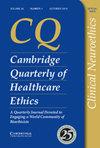异种移植临床试验和公平的患者选择。
IF 2.3
4区 医学
Q3 HEALTH CARE SCIENCES & SERVICES
Cambridge Quarterly of Healthcare Ethics
Pub Date : 2024-07-01
Epub Date: 2023-10-05
DOI:10.1017/S096318012300052X
引用次数: 0
摘要
异种移植患者选择建议将临床试验的参与限制在无法获得替代疗法或可能在等待同种移植时死亡的重病患者。尽管学术界一致认为这是可取的,但我们建议对这一限制进行审查。我们提出了三条批评:(1)风险收益的计算很可能对重病患者和社会不利;(2) 该指南与公平选择患者的标准相冲突;以及(3)选择重病患者可能会影响知情同意。最后,我们强调了当前的指导意见如何揭示了正义和慈善的社会价值观之间的紧张关系。本文章由计算机程序翻译,如有差异,请以英文原文为准。
Xenotransplantation Clinical Trials and Equitable Patient Selection.
Xenotransplant patient selection recommendations restrict clinical trial participation to seriously ill patients for whom alternative therapies are unavailable or who will likely die while waiting for an allotransplant. Despite a scholarly consensus that this is advisable, we propose to examine this restriction. We offer three lines of criticism: (1) The risk-benefit calculation may well be unfavorable for seriously ill patients and society; (2) the guidelines conflict with criteria for equitable patient selection; and (3) the selection of seriously ill patients may compromise informed consent. We conclude by highlighting how the current guidance reveals a tension between the societal values of justice and beneficence.
求助全文
通过发布文献求助,成功后即可免费获取论文全文。
去求助
来源期刊
CiteScore
2.90
自引率
11.10%
发文量
127
审稿时长
>12 weeks
期刊介绍:
The Cambridge Quarterly of Healthcare Ethics is designed to address the challenges of biology, medicine and healthcare and to meet the needs of professionals serving on healthcare ethics committees in hospitals, nursing homes, hospices and rehabilitation centres. The aim of the journal is to serve as the international forum for the wide range of serious and urgent issues faced by members of healthcare ethics committees, physicians, nurses, social workers, clergy, lawyers and community representatives.

 求助内容:
求助内容: 应助结果提醒方式:
应助结果提醒方式:


